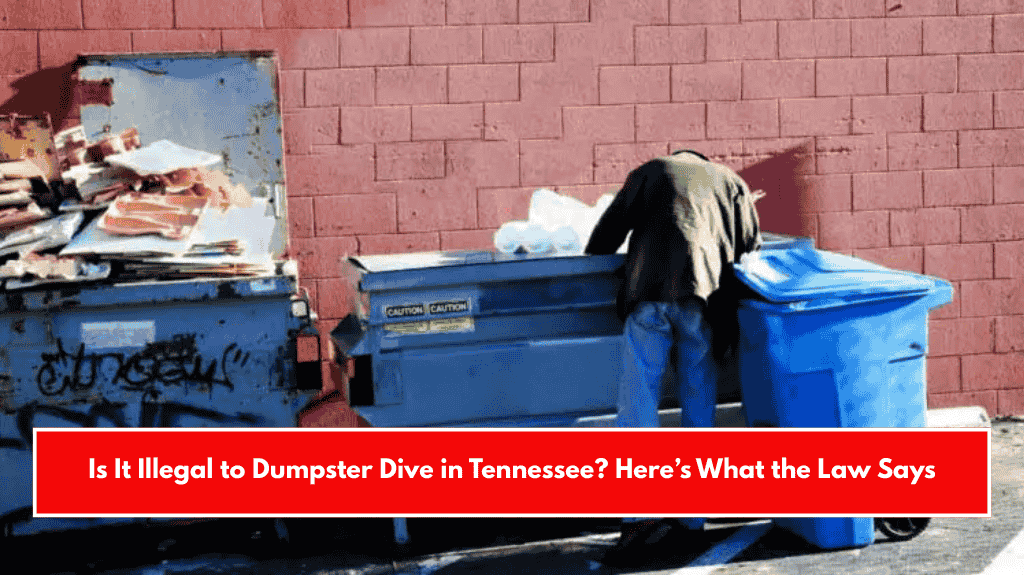Dumpster diving—the act of searching through commercial or residential trash to find items of value—has become increasingly popular in Tennessee, especially as people look for ways to save money or reduce waste. But is it legal? The answer is nuanced and depends on several factors, including where you dive and local regulations.
Federal and State Law: The Baseline
At the federal level, dumpster diving is legal in all 50 states, including Tennessee, thanks to the 1988 Supreme Court case California v. Greenwood. The Court ruled that there is no reasonable expectation of privacy for trash left for collection in a public place, making it legal for anyone—including law enforcement or private citizens—to search through it. Tennessee does not have a statewide law prohibiting dumpster diving, so the practice is generally allowed under state law.
Trespassing: The Key Legal Risk
The main legal issue dumpster divers face in Tennessee is trespassing. While the act of rummaging through trash is not inherently illegal, entering private property without permission is. Here’s how the law breaks down:
- Public Property: Dumpsters placed on public sidewalks, alleys, or parks are generally fair game. If the dumpster is on public land, you are not trespassing and can legally search through its contents.
- Private Property: Most dumpsters behind businesses, apartment complexes, or within fenced or gated areas are on private property. Entering these areas without permission can result in trespassing charges, regardless of your intentions. Businesses often post “No Trespassing” or “No Dumping” signs, and ignoring these can lead to citations or even arrest.
- Locked or Fenced Dumpsters: If a dumpster is locked or behind a fence, it is strictly off-limits. Tampering with locks or fences is illegal and can escalate the offense from trespassing to breaking and entering.
Local Ordinances and Variations
Local city or county ordinances can further restrict or regulate dumpster diving. Some municipalities may have specific rules, such as requiring permits or prohibiting scavenging in certain areas. While dumpster diving is not banned statewide in Tennessee, it’s essential to check local laws before diving, as enforcement and regulations can vary significantly from one city to another.
Other Legal Considerations
- Disorderly Conduct: Creating a mess, disturbing the peace, or refusing to leave when asked can result in citations for disorderly conduct or littering.
- Signage: Businesses may use posted signs to warn against dumpster diving. These can be used in court to show that you were aware your actions were not permitted.
- Health and Safety: While not a legal issue, it’s worth noting that dumpster diving can pose health risks, especially when searching for food.
Best Practices for Legal Dumpster Diving in Tennessee
- Stick to dumpsters on public property or get explicit permission from property owners.
- Avoid dumpsters that are locked, fenced, or clearly marked with “No Trespassing” signs.
- Check local city or county ordinances to ensure you’re not violating any specific regulations.
- Be respectful: don’t make a mess, and leave the area as you found it.
- Be prepared to leave if asked by property owners or law enforcement.
Dumpster diving is legal in Tennessee as long as you avoid trespassing on private property and do not violate local ordinances. The safest approach is to stick to dumpsters on public land or get permission for those on private property. Always check for posted signs and be aware of local regulations, as these can override the general legality of dumpster diving in the state.
Sources:
- https://www.reddit.com/r/DumpsterDiving/comments/181ptff/dumpster_diving_help/
- https://103gbfrocks.com/dumpster-diving-legal-tennessee/
- https://scrapsafari.com/dumpster-diving-in-tennessee/
- https://www.rolloffdumpsterdirect.com/dumpster-diving-illegal/
- https://www.findlaw.com/injury/torts-and-personal-injuries/dumpster-diving.html














